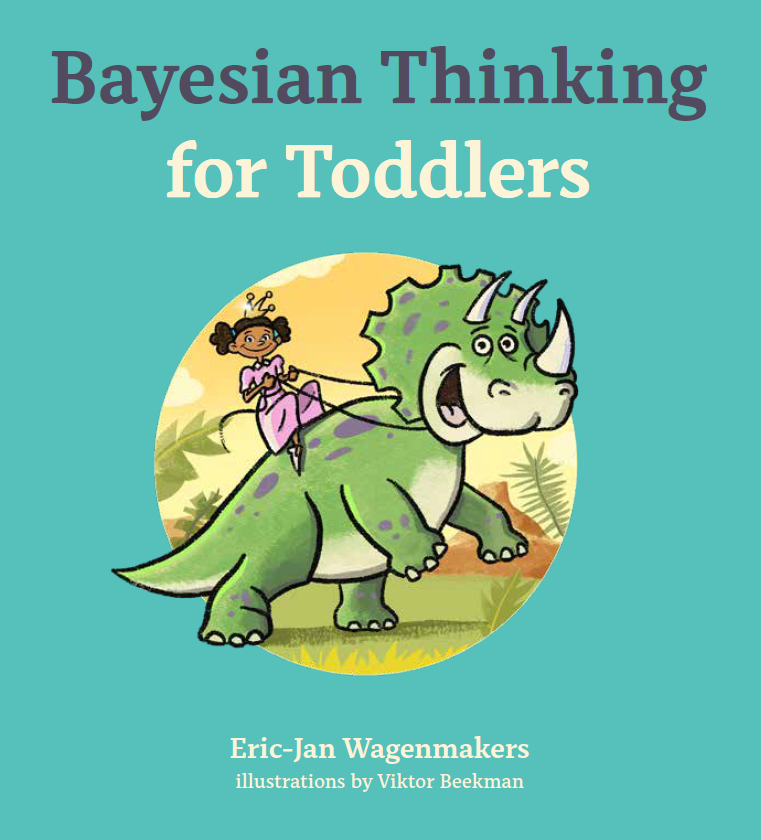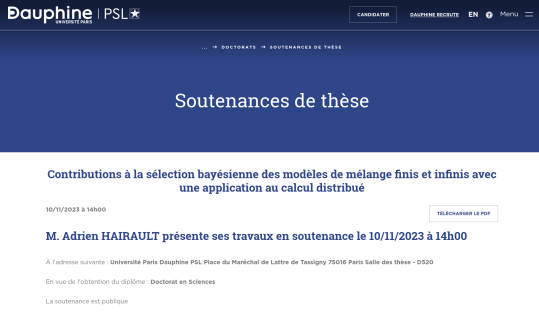Archive for thesis defence
Adrian’s defence
Posted in Statistics with tags Bayes factor, Dirichlet mixture priors, mixtures, PhD thesis, PSL, thesis defence, Université Paris Dauphine on November 10, 2023 by xi'anCongrats, Dr. Robert!
Posted in Books, Kids, Travel, University life with tags Antilles, data analysis, disphagia, Fort-de-France, French West Indes, Hyppocrates, Martinique, medical doctor, medical intern, myopathy, thesis defence, Union régionale des médecins libéraux, Université des Antilles, URML on October 31, 2023 by xi'an
off to Martinique [#2]
Posted in Kids, Mountains, pictures, Running, Travel with tags Caribean sea, family, Fort-de-France, Martinique, medical thesis, Montagne Pelée, outremer, pitons, residency, thesis defence, trail running, volcano, West Indies on October 18, 2023 by xi'anBayesian inference and conformal prediction
Posted in Books, Kids, Statistics, University life with tags AISTATS 2021, École Polytechnique, Bayesian inference, conformal prediction, differential privacy, distributed Bayesian inference, federated learning, ICML 2023, large scale inference, Paris-Saclay campus, PhD thesis, thesis defence, uncertainty quantification on October 10, 2023 by xi'anBayesian thinking for toddler & Bayesian probabilities for babies [book reviews]
Posted in Statistics with tags baby book, basic probability, Bayesian Thinking for Toddlers, book review, CHANCE, dinosaur, Harold Jeffreys, JASP, Ockham's razor, thesis defence, University of Amsterdam on January 27, 2023 by xi'an My friend E.-J. Wagenmakers sent me a copy of Bayesian Thinking for Toddlers, “a must-have for any toddler with even a passing interest in Ockham’s razor and the prequential principle.” E.-J. wrote the story and Viktor Beekman (of thesis’ cover fame!) drew the illustrations. The book can be read for free on https://psyarxiv.com/w5vbp/, but not purchased as publishers were not interested and self-publishing was not available at a high enough quality level. Hence, in the end, 200 copies were made as JASP material, with me being the happy owner of one of these. The story follows two young girls competing for dinosaur expertise, and being rewarded by cookies, in proportion to the probability of providing the correct answer to two dinosaur questions. Toddlers may get less enthusiastic than grown-ups about the message, but they will love the drawings (and the questions if they are into dinosaurs).
My friend E.-J. Wagenmakers sent me a copy of Bayesian Thinking for Toddlers, “a must-have for any toddler with even a passing interest in Ockham’s razor and the prequential principle.” E.-J. wrote the story and Viktor Beekman (of thesis’ cover fame!) drew the illustrations. The book can be read for free on https://psyarxiv.com/w5vbp/, but not purchased as publishers were not interested and self-publishing was not available at a high enough quality level. Hence, in the end, 200 copies were made as JASP material, with me being the happy owner of one of these. The story follows two young girls competing for dinosaur expertise, and being rewarded by cookies, in proportion to the probability of providing the correct answer to two dinosaur questions. Toddlers may get less enthusiastic than grown-ups about the message, but they will love the drawings (and the questions if they are into dinosaurs).
This reminded me of the Bayesian probabilities for babies book, by Chris Ferrie, which details the computation of the probability that a cookie contains candy when the first bite holds none. It is more genuinely intended for young kids, in shape and design, as can be checked on a YouTube video, with an hypothetical population of cookies (with and without candy) being the proxy for the prior distribution. I hope no baby will be traumatised from being exposed too early to the notions of prior and posterior. Only data can tell, twenty years from now, if the book induced a spike or a collapse in the proportion of Bayesian statisticians!
[Disclaimer about potential self-plagiarism: this post or an edited version will potentially appear in my Books Review section in CHANCE.

:max_bytes(150000):strip_icc()/GettyImages-465512835-092dc2b23aeb4a2cb10a38a8f9c3a78f.jpg)
